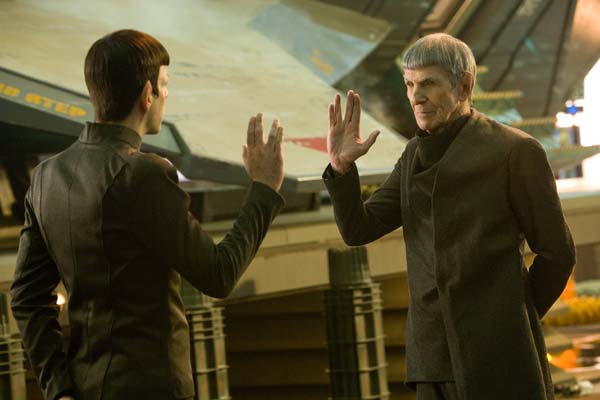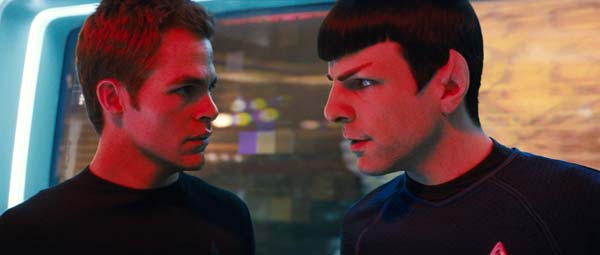Academy Award-winning composer Michael Giacchino's powerful and evocative 'Star Trek' score will be brought to life on stage by the Queensland Symphony Orchestra this February.
Simultaneously screening J.J. Abrams' acclaimed film in high definition, 'Star Trek, Live In Concert' will boldly go where no others have gone before.
Michael Giacchino, one of the best-known and most successful composers working in Hollywood today, says it is an honour to be a part of the 'Star Trek' legacy. “I was a huge fan of the series when I was a kid. J.J. Abrams' inspired new vision of the 'Star Trek' saga brought me immediately back to my childhood, as if I was watching Gene Roddenberry's brilliant creation for the first time on television.
“For me, the most exciting aspect of the 'Star Trek, Live in Concert' experience is that audiences have an opportunity to experience the film in a way that can’t be replicated in their living rooms or at the movies —with a full orchestra.”

Have you always been a Trekkie?
As a kid, I grew up watching reruns of the original series and was a huge fan. Not sure if that qualifies me as a “Trekkie” but I did collect the action figures.
Do you have a favourite 'Star Trek' series?
The original series, and some of the first films that followed. I never had a chance to watch 'Next Generation' and the others.
 How did you get started writing music professionally and what influenced you early on?
How did you get started writing music professionally and what influenced you early on?I was a huge movie fan and have always wanted to make films. When I was ten years old, I was shooting my own stop action movies that included both dinosaurs and astronauts. Of course, I loved going to the movies and was lucky to have grown up during the 'Star Wars', 'Indiana Jones' and 'E.T.' years. I remember watching films like 'Star Wars' and realising how excited the music made me feel and how integral it was to the film. I began collecting film scores. I listened to them when I fell asleep.
I was influenced by Jerry Goldsmith, Bernard Hermann, Max Steiner (in fact I remember seeing 'King Kong' and being amazed by the music), and of course John Williams. In addition to that, my dad had a great album collection, and there I found John Phillip Sousa, Peter Nero, Louie Prima, and of course classical. I also listened to international music: Irish, Mexican etc. I loved the different colours that this music provided. I was obsessed with whatever was in that record collection. I didn’t realise that later on in life it would be a huge help in my work just to have all those references running through my head.
What is it about putting music to film that you love?
Being part of the film-making team. Creating a film is a collaborative process. The fact that I get to add my part to these projects and work with talented directors, editors, sound engineers, music editors, and live musicians is all really gratifying.
Personally, what are the most exciting scores you've written? And the most difficult to write?
I loved working on the television series 'Lost'. It was an intense experience, I would get the episode and have three days to write and score it. I never wanted to know what was happening ahead of time because I wanted my emotions, my reactions to be immediate and raw. Over six years, we became a family. It was quite emotional when it was over.
One of the most difficult pieces to write was the new theme for 'Star Trek'. As I said, I grew up watching the old series. I was so excited about being attached to the project. I thought: now I have the opportunity to write some great space music! I started composing a year ahead of the film’s release, but I was having trouble composing music that satisfied me. My original cues were written in the style of a “space opera”, and they just didn’t feel right for the type of movie that we wanted to do. I had a conversation with Damon Lindelof, one of the film’s producers. Damon said, “Let’s forget about 'Star Trek'. The 'Star Trek' movie we want to do is not a space movie, it is basically the story of how two men become best friends.” Suddenly it was clear to me. The next theme I wrote, 'Enterprising Young Men' ended up in the film, and finally felt true to me.
Where do you write your music?
I have a very simple studio at my home that I write in. No big office with lots of minions - pretty much just me.
Do you ever get writer's block? How do you overcome it?
No, not really. When I'm focused I just get the writing done as fast as I can. I really enjoy it. If I need a break, I leave the office, go for a run, or play Legos with my nine-year-old.
 What must be taken into account when writing a score for film, TV or a video game?
What must be taken into account when writing a score for film, TV or a video game?In video game scoring, of course you are aware that you have to compose the music in a way that the crew can mix as needed. I would write cohesive pieces for all the settings of the game, trying to express the emotions of the different levels musically and design the cue so that it can be looped throughout. The biggest difference in scoring for TV and film (besides budget!) is the time frame. You only get a few days to write and score for TV shows. You have to be able to work very fast.
But in the end, these three different musical assignments are quite similar when it comes to the scoring process. As I said, there are budget differences which affect you as a composer, but the creative process itself remains the same. I try to get into the heads of the characters in order to translate their thoughts, fears, and emotions into music. For me, it is always about the story that wants to be told, and not so much about the different mechanics.
Do you see a screenplay before your write music for films/TV/games?
I really prefer not to read the screenplay for the films – although I have. I would rather see the films. If I read a screenplay then I am creating images in my mind that are my version of the film, not the director’s. As a composer it is my job to help the director envision the film he or she wants to make.
How much re-working goes into each score?
It depends, sometimes things work right off the bat, sometimes you watch it with the director and realise this isn’t the direction that it should be going in, and sometimes you make some changes at the sessions, right on the scoring stage. I am flexible and want to get it right for the director and the story.
What challenges (if any) are there in staying fresh for a franchise which repeats similar themes like 'Star Trek'?
You always have new characters to write for, like Kahn for 'Star Trek Into Darkness', and as the characters grow, you have the opportunity to incorporate their themes in different ways. I like going back to them, it is like seeing old friends again.
Is scoring a film with existing material from previous composers challenging?
It is exciting because I have worked with two of the most iconic television themes in history, 'Star Trek', as we mentioned above, and 'Mission Impossible'.
For 'Star Trek',J.J. and I agreed that we wouldn’t use Alexander Courage’s theme until the end credits of the first film, because this film was not about 'Star Trek' as we know it. The crew needed to earn that iconic theme first, and it becomes a bonus at the end for the fans. It worked so well for the first film, we did the same in the second.
For 'Mission Impossible' I was so nervous. I actually had lunch with Lalo Schifrin when I got the job – who, by the way, wrote the absolute greatest theme ever – to talk about the project. I asked him should I do this, should I do that, do you have any advice? And he just looked up from his salad and said, “just have fun with it.” That made it a whole lot easier!
You've said that your approach is generally to be softer as opposed to loud and dramatic, why is that?
Sometimes I think that being quiet and soft grabs your attention more than screaming at someone. For example, in the opening scene of 'Star Trek', the Kelvin is under attack, and there is only chaos on board as Tiberius Kirk is commanding his crew, while desperately trying to get his wife off the ship as she is about to give birth to our Captain Kirk. Now, I could have focused on the explosions and the fighting, but I really felt sad that this baby was about to be born who wouldn’t grow up with a father. That was where the drama was, not in the attack around them.
What inspired you to use the piano in your 'Star Trek' scores?
I love the piano and I liked the fact that it wasn't something that you would necessarily hear in the 'Star Trek' universe. For me it really helped add an intimate human element in a world which at times can feel extremely bombastic.
How do you think music is adapting in films and video games today?
I think there is all sorts of great music being written for all types of new mediums. The changes in the way that we get our entertainment has really opened the door for so many young composers. The trick is making sure that the rights of the composers the self are protected. This has been a tricky situation in the digital "isn't everything just free?" mentality of our current world.
Is there a new technique or idea that you'd like to try in the future?
I'm always looking to experiment in some new way. I'd really like to try more songwriting though. Hopefully there's a project out there with my name on it which would allow me to do that.
What do you think about Queensland Symphony Orchestra's idea to play 'Star Trek' on the big screen while the live orchestra plays your score alongside?
I am thrilled that they have chosen to perform this program that we have developed. I think that as the cinema and home theatre experience become more and more similar, it is very important to have events such as this where people can go and see something that they can't see in their own home. Most of us can’t fit a 100 piece orchestra in our living room to accompany our films at home! It also is a great opportunity to hear incredible musicians at work and to understand more clearly the contribution of musicians and music to the film industry.
'Star Trek, Live In Concert' plays the Royal International Convention Centre, 7 February.

